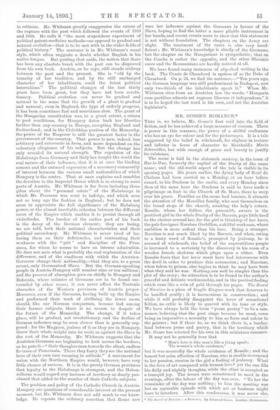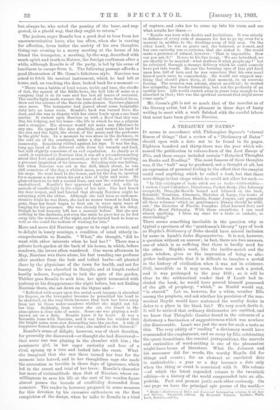MR. GOSSE'S ROMANCE.* Tan is, we believe, Mr. Gosse's first
raid into the field of fiction, and he has achieved a large measure of success. There is power in this romance, the power of a skilful craftsman who has an eye for colour and for the picturesque. It is a tale suggested by the belief in witchcraft, far slighter in texture and inferior in force of character to Meinhold's Marice Schweiclier, but with enough of grace and beauty to justify its existence.
The scene is laid in the sixteenth century, in the town of Bar-le-Duc, formerly the capital of the Duchy of the same name ; and the old-world aspect of the tale is visible in its. opening pages. Six years earlier, the dying body of Rene de Chhlons had been carried on a Monday, at an hour before sunset, to his Duchess in the castle, and every Monday since then at the same hour the Duchess is said to have made a. pilgrimage on foot to the Church of St. Maze, there to week over his grave, Familiar as the scene had become, it attracts the attention of the Mercillat family, who seat themselves on the broad steps of the church, awaiting the lady's return. Rosalie, whom her father, the gunsmith, swears is the prettiest girl in the whole Duchy of the Barrois, pays little heed to the chatter around her, for the girl is thinking of her lover, the pale foreigner Narcisse Gerbillon, a skilful workman, whose ambition is more ardent than his love. Being a stranger,. Narcisse is not much liked by the Barrois, and when, owing to a hasty word of Rosalie's, prompted by jealousy, he is accused of witchcraft, the belief of the superstitious people is increased to a certainty by the discovery in his room of a wooden female skeleton which plays upon a zither. Even Rosalie fears that her lover must have had intercourse with the devil in order to produce this automaton ; and Narcisse, when taken to prison, also begins to think he may have been what they said he was. Nothing can well be simpler than the plot of the story ; its attraction is to be found in the author's graceful and delicate workmanship, and in the poetical feeling which runs like a vein of gold through his pages. The Secret of Narcisse is a piece of fragile filagree-work that deserves to be handled gently ; it is harmonious in construction ; and while it will probably disappoint the lover of sensational fiction, no critic is likely to quarrel with its tone or style. We have always held the term "prose poetry" to be a mis- nomer, believing that the poet sings because he must, verse being as imperative a necessity to him as form and colour to- the painter ; but if there be, as we think there is, a border- land between prose and poetry, that is the territory which Mr. Gosse has selected for his own in this miniature romance.
It may not be generally true that "Man's love is like man's life a thing apart; 'Tie woman's whole existence," but it was assuredly the whole existence of Rosalie ; and the honest but calm affection of Narcisse, who is unable to respond to her passion, creates in the girl a feeling of jealousy. What is the love of art compared with human love P yet the one fills his daily and nightly thoughts, while the other is accepted ae a tranquil joy. The lovers were accustomed to meet in the evenings, after the labour of the day was over. "To her the remainder of the day was nothing ; to him the meeting wee- but an agreeable episode with which art or business might have to interfere. After this rendezvous, it was never she, * The Secret of Narcieee ; a Romance. By Edmund Goase, London: Hoinonutnn.
but always he, who noted the passing of the hour, and sug- gested, in a placid way, that they ought to return."
The jealous, eager Rosalie has a good deal to bear from her -uncommunicative lover, who too often, when she is craving for affection, loves better the society of his own thoughts. Going one evening to a merry meeting at the house of his friend the trumpeter, a meeting, by-the-way, described with much spirit and truth to Nature, the foreign craftsman after a while, although Rosalie is of the party, is led by his sense of loneliness to escape from it. The following passage affords a good illustration of Mr. Gosse's felicitous style. Narcisse was asked to fetch his musical instrument, which he had left at home, and, on reaching the door, looked back for a moment "There was a babble of loud voices, treble and bass, the shuffle of feet, the squeak of the fiddle-bows, the full tide of noise in a company that is at its ease and has lost all traces of restraint. The candle-light made warmer the hues of all those flushed faces, drew out the colours of the Barrois gala-dresses. Narcisse glanced once more. The trumpeter had passed about some hospitable duty into an inner room. Rosalie's back was turned from the door, and she was in dispute with her sister Lucie upon some local matter. It rushed upon Narcisse as with a flood that this was Bar, his lodging, not his home—the life in which he was a pilgrim and a stranger. His absence would not make any difference to any one. He opened the door stealthily, and turned his back to the riot and the light, the shriek of the music and the perfumes in the girls' hair. In a moment he was alone in the darkness, in the cold air of the courtyard, under a dim vault of colourless immensity. Something rubbed against his legs. It was the dog, long ago tired of its enforced exile from the warmth and food, but still slightly conscious of an evil reputation. As clearly as it could, it explained to Narcisse that it was all a misunderstanding about that fowl, and glanced around, as dogs will do, as if inviting a personal inspection of its innocence. Drizzling rain was falling, but when Narcisse was out in the dull, blank street, he was still conscious of the dog, a whitish mass, moving just in front of his stops. He went back to the house, and let the clog in, opening for a moment a door which let out a tide of light and noise. He glanced back as he left a second time, and saw the window hastily unshuttered. Rosalie's face appeared dark and flat, with an aureole of candle-light in the edges of her hair. She had heard the door reopen, and had fancied that already Narcisse might be returning with the zither, Although she had been so undemon- strative while he was there, she had no sooner turned to find him gone, than her heart began to beat out in wave upon wave of longing for his presence. She was already fretting at his delay, though he had scarcely left her a moment before. But she saw nothing in the darkness, not even the smile he gave her as he fled away into the wetness of the night, and she turned back to bear as well as she could the tedium of waiting for him."
More and more did Narcisse appear to be rapt in reverie, and to delight in lonely musings, a condition of mind utterly in-
.comprehensible to Rosalie. "What," she thought, "did he want with other interests when he had her P" There was a private herb-garden at the back of his house, in which, before sundown, the lovers often wandered. One warm afternoon in May, Narcisse was there alone, his feet treading one perfume after another from the lush and tufted herbs—all planted
there by the physicians of the town for health, and not for beauty. He was absorbed in thought, and at length rushed hastily indoors, forgetting to look the gate of the garden. Thither goes Rosalie to seek him, her spirit tormented with jealousy at his disappearance the night before, but not finding Narcisse there, she sat down on the thyme and--
" Reflected with anger upon the metal-work because it absorbed his fingers, on the trumpeter because he permitted his head to be sketched, on the very birds because they took her lover away from her to those water-meadows whither she might not fol- low him. Suddenly, from where she sat, she heard in the atmosphere a clear note of music. Some one was playing a well- known air on a flute. Rosalie knew it by heart. It was a favourite tune with Narcisse, and it was from his window that the bright notes were now descending into the garden. A tide of 'happiness flowed through her veins ; she smiled as she listened."
Rosalie's sense of delight, however, was of short duration, for presently she discovered—or thought she had discovered— that some one was playing in the chamber with him ; the passionate girl, in her eager curiosity and fear of a 'rival, sprang up a tree and looked into the room. What ,she imagined that she saw there turned her love for the moment into hatred, and in her thoughtless rage she made the accusation so terrible in those days of ignorance, which led to the arrest and trial of her lover. Rosalie's character has more of verisimilitude than that of Narcisse, whose un- willingness to save his life at the cost of his wooden figure almost passes the bounds of credibility demanded from
romance. The reader is, however, prepared in some measure for this devotion by his excessive enthusiasm on the first completion of the design, when he talks to Rosalie in a kind of rapture, and asks her to come up into his room and see what awaits her there :—
"Rosalie was torn with doubts and hesitations. It was utterly in defiance of every code of manners for her to go up, even for a moment in midday, to the dwelling-room of this man. On the other hand, he was so grave and, she believed, so honest, and her own curiosity was so extreme, that she risked it. She would make a pretence of refusal, however : That is impossible. How can you ask it ? ' It rose to his lips to say, We are betrothed, we are shortly to be married—what matters it what people say ?' but he refrained, through a strange delicacy which he could scarcely have put into words. He saw the burning eyes of this girl fixed upon him, full of love, and he was conscious that his own mood leaned much more to comradeship. He would not suggest any- thing that should place them, at that moment, on an amorous footing. The occasion was solemn, almost sacrificial ; he wanted her sympathy, her tender friendship, but not the profanity of an earthly love. Life would stretch away in years long enough to he absorbed in that; this was the spiritual moment that might never come again."
Mr. Gosse's gift is not so much that of the novelist as of the literary artist, but it is pleasant in these days of hasty writing to meet with a work finished with the careful labour that must have been given to Narcisse.



































 Previous page
Previous page